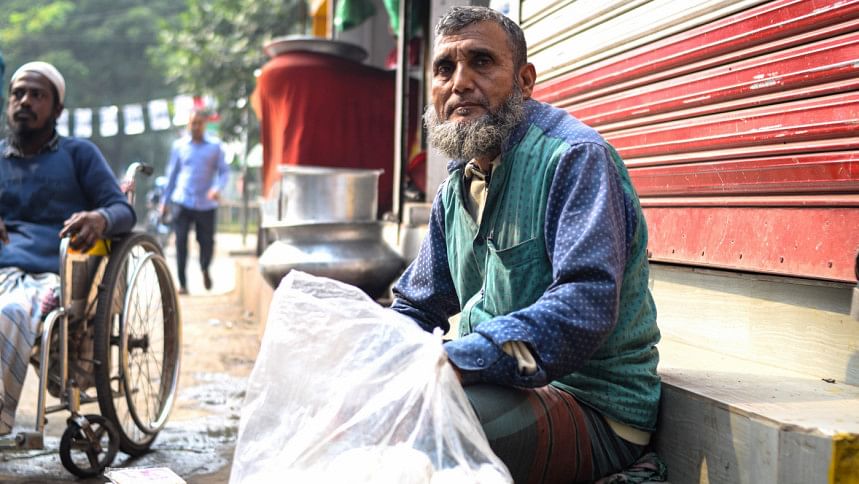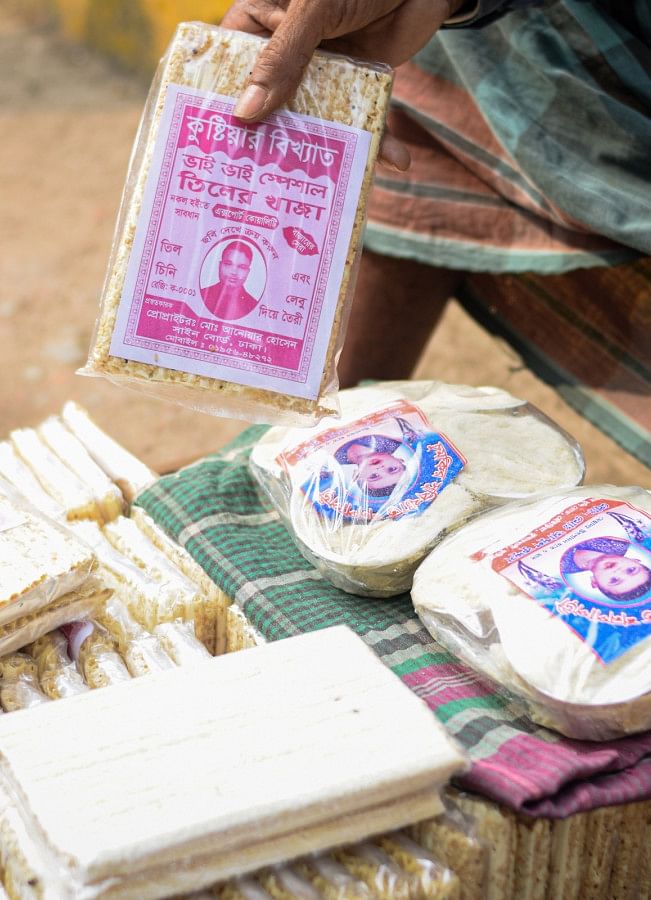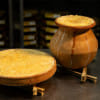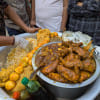Meet Mohammad Ali: Bringing Kushtia’s shon papri and tiler khaja to Dhaka’s streets

Scrumptious tiler khaja (sesame seed candy) and shon papri holds a special place in our hearts, so much so that occasionally, we still find ourselves indulging in the magic of shon papri and tiler khaja. An elderly hawker, Mohammad Ali's life has been intertwined with these sweets for over three decades. Ali brings these culinary gems from Kushtia, offering a taste of tradition that has endured through the years.
"People in Kushtia are experts in the art of making shon papri and tiler khaja. I bring them to Dhaka from Kushtia," said Ali.
Ali travels to the bustling streets of Dhaka, carrying with him these traditional sweets, each piece a product of love, delivered to us from his community.
Memorised by heart, thanks to years of experience, Mohammad Ali narrated the process of making shon papri and tiler khaja as if he could see them being made from scratch right in front of his eyes.
Shon papri is a harmony of simple ingredients — gram flour, sugar, and ghee — prepared to create a texture and taste that melt in the mouth as soon you taste it. Gram flour, the primary ingredient, is carefully roasted in ghee until it achieves a golden hue, releasing a nutty aroma that forms the soul of this sweet delight.
The flour is then meticulously mixed with a syrup made from sugar, often infused with cardamom or rose water, adding layers of subtle, aromatic flavours. This mixture is then patiently stirred and cooled to achieve the signature flaky, yet melt-in-the-mouth consistency that shon papri is renowned for.
Ali explained, "Crafting shon papri is an art that demands precision and patience. It is judged not just by its taste but by its texture. The layers need to be thin and delicate, yet hold together, creating a luscious mouthfeel."

Tiler khaja, at its core, is a celebration of sesame seeds. It starts with the sesame seeds being carefully cleaned and then toasted to perfection. This process is important as it brings out the aromatic oils and the rich, nutty flavour that is characteristic of the candy. Once toasted, the seeds are mixed with jaggery or sugar syrup, which has been heated to just the right temperature to attain a caramel-like consistency.
According to Ali, the consistency of the syrup has to be perfect — too thin, the candy will not hold its shape; too thick, it becomes too hard to chew — and once the syrup reaches the desired consistency, it is swiftly mixed with the toasted sesame seeds, ensuring an even coating and forming a glossy, sticky mixture.
From here, the skill of the artisan comes into play. The mixture is quickly turned out onto a flat surface and rolled out while it is still warm and pliable. It is then cut into bite-sized pieces or shaped into small balls, each a perfect mouthful of crunchy, sweet, and nutty goodness.
Highlighting the challenges, he faces daily, Ali mentioned that he did not have any shop, where he would sit and sell under the comfort of a roof. The absence of a permanent storefront in Dhaka is not just a matter of convenience but a financial constraint.
"For every packet we sell, our income is not much and we get to have a profit of Tk 7 to 8 if we can sell at Tk 50 or 60," elaborated Ali. This economic reality paints a poignant picture of the struggle street hawkers like him endure to keep traditions alive.
Mohammad Ali is not merely selling sweets; he is essentially keeping a part of our country's culinary soul alive. In every packet of shon papri and tiler khaja he sells, there lies a story of heritage and a slice of Bangladeshi tradition. May his dedication — against the backdrop of urban chaos and economic challenges — shine as a beacon of hope, ensuring that the sweet legacy of our country continues to delight and inspire.
If you wish to try the delicious shon papri and tiler khaja of Mohammad Ali, contact him at +8801952824150.

 For all latest news, follow The Daily Star's Google News channel.
For all latest news, follow The Daily Star's Google News channel. 








Comments